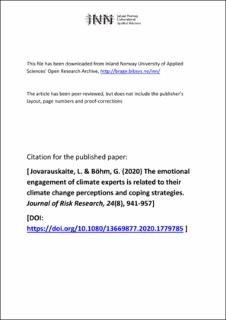| dc.contributor.author | Jovarauskaite, Lina | |
| dc.contributor.author | Böhm, Gisela | |
| dc.date.accessioned | 2023-06-05T13:13:07Z | |
| dc.date.available | 2023-06-05T13:13:07Z | |
| dc.date.created | 2020-09-16T13:13:25Z | |
| dc.date.issued | 2021 | |
| dc.identifier.citation | Journal of Risk Research. 2021, 24 (8) . | en_US |
| dc.identifier.issn | 1366-9877 | |
| dc.identifier.uri | https://hdl.handle.net/11250/3069967 | |
| dc.description | ß2020 Informa UK Limited, trading as Taylor & Francis Group.
Dette er den aksepterte versjonen av en artikkel publisert i Journal of Risk Research. Du finner den publiserte artikkelen her: https://doi.org/10.1080/13669877.2020.1779785. // This is the postprint version of the article published in Journal of Risk Research. You will find the published article here: https://doi.org/10.1080/13669877.2020.1779785 | en_US |
| dc.description.abstract | The study aimed to reveal the role of emotions in Lithuanian climate experts’ perceptions of climate change (i.e., their beliefs about the causes and risk perceptions of climate change) and fill the gap in scientific knowledge about the coping strategies that climate experts tend to employ in order to deal with climate-change-related emotions. To investigate climate experts’ emotional reactions to climate change, we applied a four-factor model comprising morality-based other- and self-related as well as consequence-based retrospective and prospective emotions. The results indicated that the climate experts showed great variation in their emotional reactions; two clusters of experts emerged – those who were emotionally engaged and those who were disengaged with regard to climate change. Emotionally engaged experts were more likely than their disengaged counterparts to emphasize anthropogenic climate change, to believe that the consequences of climate change would appear both locally and globally, and to consider the consequences to be uncontrollable, dreadful, and morally unacceptable. Emotionally engaged and disengaged climate experts agreed on the extent to which they evaluated climate change as societally disputed. Additionally, experts working in the government were more emotionally engaged with climate change issues than academics. Finally, in order to deal with climate-change-related emotions, emotionally engaged experts were more likely to invoke problem- and emotion-focused coping strategies, whereas the two groups of experts did not differ in their tendencies to avoid climate change issues. | en_US |
| dc.language.iso | eng | en_US |
| dc.subject | climate experts | en_US |
| dc.subject | emotions | en_US |
| dc.subject | risk perception | en_US |
| dc.subject | coping | en_US |
| dc.title | The emotional engagement of climate experts is related to their climate change perceptions and coping strategies | en_US |
| dc.type | Peer reviewed | en_US |
| dc.type | Journal article | en_US |
| dc.description.version | acceptedVersion | en_US |
| dc.subject.nsi | VDP::Samfunnsvitenskap: 200::Psykologi: 260 | en_US |
| dc.source.pagenumber | 1-18 | en_US |
| dc.source.volume | 24 | en_US |
| dc.source.journal | Journal of Risk Research | en_US |
| dc.source.issue | 8 | en_US |
| dc.identifier.doi | 10.1080/13669877.2020.1779785 | |
| dc.identifier.cristin | 1830440 | |
| dc.relation.project | Equinor: Akademiaavtale; project number 803589 | en_US |
| cristin.ispublished | true | |
| cristin.fulltext | postprint | |
| cristin.qualitycode | 1 | |
